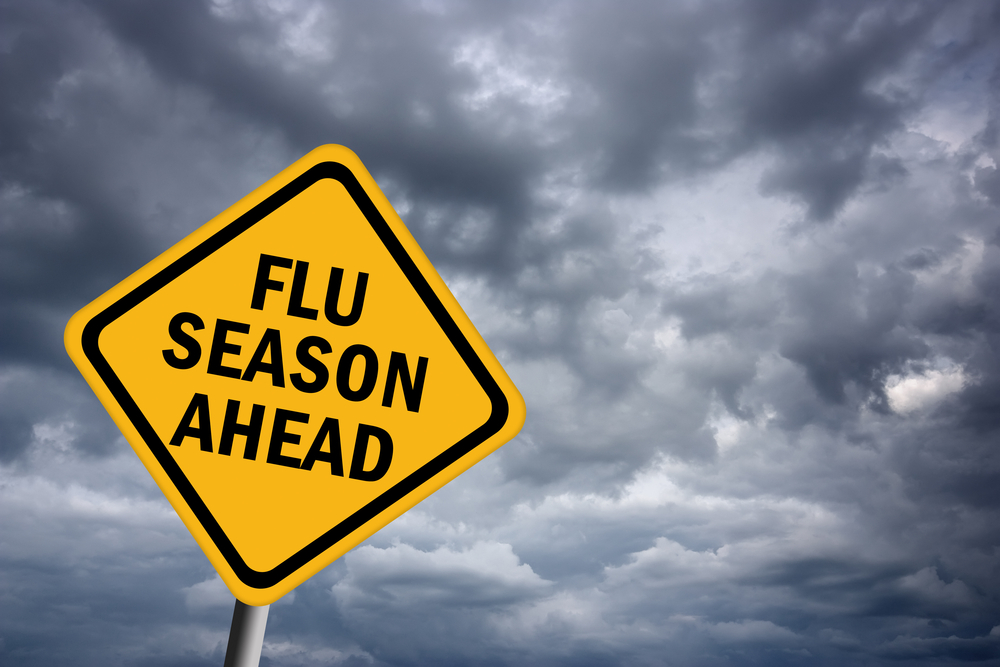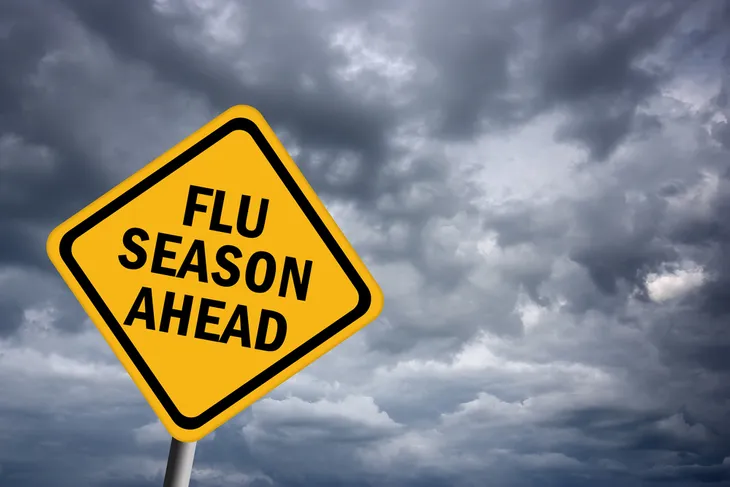No part of the world is entirely safe from it but, armed with a brand-new flu shot every year, doctors and patients are determined to beat back the annual wave of influenza this year and into the future.
Most of us know of the existence of the annual flu shot. Some of us get it every year! But few Americans know how the flu shot actually works, when it’s most effective, and in which month they should roll up their sleeves and get it. Today, we set out to answer all those questions and more in this comprehensive flu shot breakdown. Let’s go!
How the Flu Shot Works
There’s a new flu vaccine every single year. Designed months in advance, researchers determine which strains of influenza A and influenza B are poised to spread in the upcoming flu season and plan work accordingly.
Once created and injected, the vaccine begins training your body’s immune system to react to the first signs of the upcoming flu. There are two types of vaccines: inactivated and live. Where inactivated vaccines are merely a protein coat of the virus in question, whereas live vaccines contain a weakened version of the virus or bacteria.
Flu shots aren’t only available by injection either. Nasal spray alternatives exist, but depending on the year, some are more effective than others.
When Does It Start Working?
In a perfect world, vaccinated patients would be flu safe as soon as they left their doctor’s office. But unfortunately, that’s far from the case. Activating your immune system and safeguarding it against the flu of the season takes time. Up to 2-weeks to be precise. More reason to time your jab strategically. But more on that later.
During this two-week transition, you should still take the necessary precautions to protect yourself from contracting the virus. Wash your hands, avoid touching your face, and continue to work out, sleep well and eat healthy to keep your immune system tuned up.
Side Effects of the Flu Vaccine
Countless Americans receive a flu shot and experience zero symptoms at all. That’s not to say that the vaccine is side-effect-free.
Some patients do report the existence of side effects directly following their jab, though most of them are mild and clear up after just a few days. Those side effects may include headache, lightheadedness, a low-grade fever, muscle aches, nausea, and pain at the injection site.
Severe Side Effects
Most side effects from the flu vaccine are mild. Some individuals don’t even experience any. That said, a severe allergic reaction is possible but keep in mind, it’s very rare.
Symptoms of allergic reactions typically appear within 3-hours of the jab and may include fainting, hives, rapid heartbeat, swelling of the eyes or the lips, trouble breathing, and wheezing. If you develop symptoms before you leave the clinic, alert a nurse or doctor. If you already left the clinic and begin to develop severe symptoms, get emergency medical help immediately.
Benefits of the Flu Vaccine
Millions of Americans chose to get vaccinated for influenza every single year because doing so comes with some substantial benefits. Not only can a flu vaccination keep you from getting sick from the flu, but it can also reduce the risk of hospitalization for children and adults alike. It plays a critical role in protecting those with chronic health conditions and has even been shown to protect women during and after pregnancy.
Getting vaccinated can help protect the people around you too, especially those who are particularly vulnerable to serious illnesses like newborn babies, young children, and the elderly.
Effectiveness
With a brand-new vaccine created every single year, you can expect its overall effectiveness to wax and wane. Recent studies have shown that vaccination can reduce the risk of influenza illness by 40-percent to 60-percent. But those numbers aren’t only affected by the vaccine’s quality. A person’s age and general health level can play a factor too.
In short, familiarizing yourself with the effectiveness of the annual vaccine has become a part of the flu shot process for most people. The Centers for Disease Control and Prevention (CDC) offer full transparency in this manner, and you’re encouraged to read up on the effectiveness of this year’s flu shot.
Who Should Get the Flu Shot?
In short, anybody above the age of 6-months should get the flu shot every single year. There are specific groups who are more at risk of developing a serious illness and should make getting the flu vaccine a serious priority.
People over the age of 50, children between the ages of 6-months and 5-years of age, anyone with chronic medical conditions, pregnant women up to 2-weeks post-pregnancy, and people with weakened immune systems belong on that list. Healthcare workers, caregivers, and anyone living or working in a nursing home or chronic care facility should get one too.
Who Shouldn’t Get the Flu Shot?
Infants under the age of 6-months shouldn’t receive the flu vaccine. If you are currently sick, you should wait to receive the vaccine until you are feeling better. Further, individuals with Guillain-Barré syndrome should talk to their doctor before receiving the vaccine.
Finally, if you have a severe allergy to any of the ingredients in the flu vaccine, you shouldn’t get the flu shot. Some of the common ingredients include egg protein, monosodium glutamate (MSG), antibiotics (such as neomycin and gentamicin) polysorbate 80, formaldehyde, and a preservative called thimerosal. Talk to your doctor if you’re concerned about having an allergic reaction.
The Best Month to Get the Flu Shot
The CDC recommends timing your flu shot strategically to ensure your best chance at full protection. Doing so requires that patients be vaccinated roughly 2-weeks before the flu begins spreading in their community. You want to make sure you don’t get your shot too early either, as research has been linked with reduced protection.
So, when should you get your shot? It’s best to make plans for early Fall, or no later than the end of October.
Where Can You Get the Flu Shot?
Getting the flu vaccine is usually easy. You can get the flu shot at your local pharmacy and many walk-in clinics offer it too. Just make sure you call ahead to confirm they offer it.
Further, you can also book an appointment at your doctor’s office to receive the flu shot. Finally, you can ask your employer if they provide flu shots for their employees.
How Much Does the Flu Shot Cost?
Many health insurance companies in the United States will cover the costs of your flu shot. However, if you’re uncertain if you’re covered, simply give your insurance company a call to find out if you have to pay out of pocket.
If you don’t have health insurance, it should only cost you around $50 or less. But, if you don’t have health insurance and you can’t afford it, you may be able to find it for free. You can call your doctor’s office, local hospital, local clinics, or state health department, and explain your situation. You can also ask about coupons that may help you get the vaccine at a reduced cost.
The Takeaway
We hope that you leave us today with a better understanding of how the flu shot works, why its effectiveness changes year over year, who should most certainly get one, and when.
The flu shot is the best way to protect yourself against serious complications from influenza. And it doesn’t just protect you either, it can also prevent transmission and keep the community safe.















